- Home
- Theodore Taylor
Teetoncey and Ben O'Neal Page 3
Teetoncey and Ben O'Neal Read online
Page 3
Morning broke and somehow Teetoncey had put her boat in order. Maybe she'd had time to think during the night and realize that we might be humble folks but we meant well. Besides, she didn't have much choice. She was kinless. Anyway, she was almost human in the morning, almost cheerful, talking a little bit instead of crying and moping. Right off, she talked strangely, calling a dress a frock.
My chores of chopping wood and emptying the garbage pail and filling the oil lamps were done about eight-thirty, almost the same time that Teetoncey finished helping in the kitchen—she'd volunteered, to my amazement—and I raised the window to ask, "You like to ride Fid?"
"Oh, very much," Tee responded.
Mama cautioned her. "Sometimes that pony can act up."
"I'll be quite all right, thank you," the girl answered, as British as ever.
Before I could get five feet away, I heard Mama stealthily warn her, "Ben might not be like boys in your country. He's rough at times." That made me mad.
"I'll watch myself, Mrs. O'Neal," was her reply.
Then Mama came to the window and looked out at me, didn't say a word but gave me cold eyes—Ben, you hurt her and I'll have Filene strop your mooney.
I returned her look with as much innocence as possible, then got Fid and brought him up about the time Tee came off the stoop in one of my old sweaters. The red bob-cap Mr. Burrus had contributed to her wardrobe was on her head.
I said, "Teetoncey, I'll help you up on him, then take the reins..."
"I think I can get up," she said, and with that, she went up backward, a kind of hike, like she had springs in her toes. I was surprised.
Fid was low to the ground but I still had to jump up a little to board him. I wondered why and how she'd done it but didn't ask. "Now, swing a leg over him."
She looked at me calmly. "If you don't mind, I prefer to ride this way."
"With both legs on one side. You got no saddle."
She nodded and grasped the reins with one hand, Fid's mane with the other.
It seemed to me that she was just showing off like a circus rider and I did something without really thinking about it. Yet I suppose it had been in the back of my mind. She'd annoyed me off and on—taking over my room, sleeping in my bed, practically stealing Boo Dog from me. I shrugged and looked back to see if Mama was watching. She was nowhere to be seen. Just to get him started, I drew back and hit Fid on the rump hard enough to stun my wrist-bone. I didn't mean to whack him that hard.
He shot out, and I fully expected to see Tee dump. But she stayed on at least forty feet down the path until she pitched into a myrtle bush.
I walked on down to help her out. Her face was red and I couldn't tell whether she was hurt or angry, but her eyes had some fire in them. At least, she wasn't thinking about her dead folks.
I said, "You'll learn."
Fid was about twenty feet away, gnawing on clump grass, and she went over to him, took the reins, did the odd backward spring, grabbed his mane, and clucked him away. She called back to me in a cool, crisp tone. "I ride sidesaddle in England, Ben. I'm really very good at it."
I stood there a long time, watching the red bob-cap go up and down through the low dunes. It occurred to me that she might have some spunk. It also occurred to me that if she ever fell off into any of our prickly pear or Spanish dagger she might "prefer" to ride the way we did, nestling the animal.
In early afternoon, I took Tee over to see Filene at Heron Head Station. Mama begged off because she was not up to wrangling with Filene so soon again but instructed me to withdraw Teetoncey if she got tired from all the questions.
We bumped and wound east in the pony cart along the trail to Filene's station. Boo Dog trotted behind, keeping his sympathetic black eyes pinned on Teetoncey. Some ruddy ducks angled across the clear blue winter sky, leaving sharp cries in their wake. Boo didn't even look up, having been taken captive by a female. In fact, I think he'd convinced himself that he alone had found and saved this girl. Miserable hound.
Holding on, looking around, Teetoncey said, "I have never seen such desolate land." Compared to London, I suppose it was.
Like white-gray meringue, windblown sand ridged up here and there, sparsely dotted with clumps of spiked grass. Now and then, roots of sea-tumbled stumps, sent in on raging tides, reached out like dark witches' fingers. Toward the ocean there was not so much as a shack to break the bleak landscape. I had read something of London and this did not resemble the palace grounds or that place that sounded like a jar of relish, Piccadilly.
"Have you always lived out here?" she asked.
I nodded.
"Does everyone fish for a living?"
"That and lifesave," I said. "But not me, personally. Mama does not take to me going out on the water. I do store work Otherwise, I suppose I'd be fishing, at least." The sounds were good for that, and shad was the best money fish. There had been sturgeon around, but they were gone now. There was always mullet but mainlanders hadn't really learned how to eat them.
"Your mother told me that you'd seen what was left of the Malta Empress."
I glanced over. "Both that night and the next day."
"What did you see?"
"Timbers busted up. Some clothes, boots. Barrels. Anything that would float. Spars." I decided not to discuss the row of bodies under the tarpaulins, nor to say I'd seen her papa after Jabez dropped him, mouth open and stony dead, at Filene's feet that night. "There wasn't much to see."
"No chests?"
Now, that was a very odd thing she wanted to know about. I shook my head. "I didn't see any. They don't float unless there's a lot of air space in them. Truly, there wasn't enough of that ship for the wreck commissioner to come down. Not enough for vendue. That's auction. Everybody bids on what is left."
She was thoughtful for a minute. "Where did it happen?"
"Not far from here. About two miles. I'll show you someday." Of course, she'd seen it two nights ago; once before that in daylight. I had to keep reminding myself of that blank period in her life.
We were just about to the ocean and I drove the cart up on a dune. The ridge sloped down to the beach and tideline. "Stand up, Teetoncey," I said, "and you'll see a sight most people have never seen."
Planting her feet in the canvas bag behind Fid's tail, she rose up and saw our skeletons of ships that stretched for miles along the beach in both directions. She didn't say much for a moment but then asked, "Did the Empress look like that?" She pointed to the nearby Hettie Carmichael, which had most of her keel, a lot of ribbing, and some of her stern left.
I said, "Not at all. What was left of the Empress could be put in five mule wagons." I did not tell her the Gillikins were having an extra room built from timbers of the Empress.
We went on to Heron Head Station with Tee in a pond of silence.
Although he gave me a dark look, Keeper Midgett was most kind to Teetoncey. He introduced her to all the surfmen, as if they'd never seen her before. They made over her, especially Jabez. Then Filene found a bottle of sarsaparilla but she declined it and true to himself, he didn't offer me any. Finally, he got his notebook with smudged pages on it, showing signs he'd thumbed it a hundred times; then that stub of pencil began moving jerkily across paper as if it had a brake on, swallowed in his thick fingers.
Surprisingly, she didn't tell us much more than we already knew. But it was of intense knowledge to learn that the bark had blown its sails out one day past Norfolk, then drifted back, rudder shackled, at the mercy of the long rollers, until it foundered on Heron Head Shoal. Her papa had tried to swim to the beach, as Jabez had guessed, after her mama had been bashed on deck. We also learned that her papa, who was a landholder and a barrister, which is like a lawyer, had chartered that ship, paid fully for her voyage from New York to the Barbadoes and back. That took a pretty penny, I was guessing. So the Appletons had to be rich. There were some other details that would not be of interest to land-faring people—a sea flooded her steam boiler for the donkey engine, stop
ping the pumps.
Speaking very officially, Filene said, "Of the thirteen bodies, we identified what we thought was your mama and papa. There was also a man I took to be the master by the way he was dressed..."
Teetoncey said, "His name was Hawkins."
Filene slowly wrote it down.
"There was also a peg-legged man."
Tee said, "The only name anyone called him was Ezra. He was the cook. A West Indian."
Filene wrote it down and then asked, "Miss, did you happen to see the cargo manifest o' that ship? What was aboard her? I git the impression she was in ballast." Ballast was mainly empty but with enough rock aboard to keep her steady.
Naturally, not being a sailor, Tee asked, "What is a manifest?"
"A list o' cargo an' passengers. We found a pad of 'em off the Empress but they were blank. Didn't tell us anything but the ship's name." He dug around in a drawer of his rolltop desk and came up with some old water-stained manifests off other ships. He adjusted his specs on his nose for close reading and then said, "Somethin like this." He began to toll them off: "Schooner Donald Beam, master-owner Hugh Beam, out o' St. Thomas, thirty tons o' ballast, nine hundred oranges, barrel o' yams, one demijohn gin, one thousand dollars in gold..."
I looked at Teetoncey. Her eyes had narrowed. I wondered why.
"Here's another one," said Filene. "Brigantine Herbert Pettit, master Craig Thompson, thirty-four puncheons o' molasses, eleven barrels o' sugar, one bundle o' letters, twelve hundred bushels o' salt, seven hundred fifty dollars in gold..."
Teetoncey shook her head, saying, "I did not see anything like that." But she had a queer look on her face, as if a small goose egg might be stuck in her throat.
Filene said, "Well, she mus' 'ave been in ballast. We didn't see any signs o' cargo."
Tee fell silent once again.
Filene stood up. "Bye 'n bye, we'll hear from the Barbadoes an' from Lloyds o' London."
I came out of my refuge in the corner, where I'd been listening, but Filene said loudly, "I haven't finished, Ben..."
I retreated.
To Teetoncey he said gently, "We took the normal respects with those bodies, Mark Jennette carved an A on the crosses we thought was your mama and papa."
"Thank you," said Tee, visibly sad.
Then Filene eyed me sharply. "Tell your mama I did not eat this girl alive."
I nodded respectfully and took Teetoncey up to the lookout cupola where Luther Gaskins was on duty, watching a three-masted schooner through the long glass. Then I showed her the equipment room with the breeches buoy, which is like a pair of sawed-off canvas pants, hanging under a round ring float which resembles a mainland toilet seat. The canvas pants run on a line between the wrecked ship and shore. I also showed her the lifesaving car, which is shaped like a cigar and holds four men; dangles beneath the line from shore to ship; next, the lap-boarded surfboats which were rowed out to wrecked vessels. She was impressed. She also liked the practice wreck pole and I took pains to say I'd once had a wild ride down from it in a breeches buoy.
But a Hatteras cat had her tongue all the way home. She was clearly troubled about something above and beyond her deceased folks.
When we got to the house I found out that the mail rider had brought a letter from Reuben. He said he was sorry but he'd be gone on the Elnora Langhans for at least another eight months. The coasting brig was now shuttling cargo between Port Fernandino and Trinidad. He sent us a hundred dollars which was plenty to last between now and spring, when Mama and I would start making gill nets again, especially since I was still getting five dollars a month from the Burrus store. Mama was sad, though, that Reuben would be gone so many months. I missed him, too.
4
TEETONCEY WAS a chatterbox at supper and I suppose it was because she was still bereaved and frightened; still uneasy in a strange house and unknowing of us, though that was changing. Mama said that people who are skitterish sometimes talk a lot and say nothing. She said plenty. Whatever was priming her pump, it all gushed out. That girl evidently knew her London.
I learned that Teetoncey lived in a fancy section called Belgravia, off Belgrave Square, near Hyde Park, in a four-story house that had iron-railed balconies. I had guessed, previously, that she lived in a fancy place so Belgravia was not a surprise. They had a horse tender, known as a groom, and a gardener and a gardener's boy, and a parlormaid and a housemaid and "tweeny" maids, which I took to be maids that ran between the floors. They also had a house in the country and Teetoncey went to a private school. Sundays, in season, they strolled in Hyde Park with her papa in a top hat and her mama with an umbrella, even though it wasn't raining. My mouth was open the whole time as was the mouth of Widow O'Neal.
I left when Mama started talking about having a "tea" so that all the women on the Outer Banks could hear about London firsthand. I wondered where Mama herself had heard about teas, but it didn't matter. My head swimming with knowledge of Queen Victoria, London Bridge, trains of the Great Northern Railroad where you could eat in a padded chair, horse buses with seats on the roof, I went over to Kilbie Oden's house, a few hammocks up from us.
Kilbie was in the kitchen, honing fish knives for his papa. Frank Scarborough was there, too. Without his white speckling of niter salve that night, Kilbie's pimples were worse than usual. His red hair wasn't combed. From his neck up, he seemed to be flaming. But out of all the pimples and brick hair came light blue eyes. Kilbie was a startling-looking boy.
I began to tell them everything that had happened the last two days, but Frank Scarborough, who was as handsome as Kilbie was uncomely, said, "We alriddy heerd." Then I started to tell about London, via Teetoncey, but they weren't interested in that, either.
Zipping a thin blade back and forth over the hone stone, Kilbie looked up with those stabbing blue eyes. "She ain't gonna be with you long, Ben."
"How do you know that?" I asked.
"Filene got word 'bout suppertime from Inspector Timmons that the British consul would leave Norfolk tomorrow an' come out an' pick her up."
"Who said?"
Frank opened his mouth. "Luther Gaskins tol' Papa."
"Why hasn't Filene tol' Mama?" I asked.
Kilbie thought he knew. "He's feared o' tellin' her, plenty some. He didn't think it'd go this fast. Filene knows your mama is attached to that girl, an' he's lickin his lips tryin to think o' a way to tell her."
There went a lot of plans. Earlier in the day I had been thinking of using that girl to ease me out of the house. I was already out of my own room and bed, and with her around to jabber about dresses and things there wouldn't be such a ruckus when I went to Norfolk and started asking at the ship chandlers for a cabin boy's berth. No one could accuse me of abandoning Mama if Teetoncey settled in. I said, "The consul can't do that."
Frank said, "You don't own her." That was true.
I left Kilbie's house with half a mind to go to Heron Head Station and confront Keeper Midgett but thoughts of such a meeting raised a ticking in my stomach. So I took a long time walking home under the stars, trying to figure out what we might do. The route I followed avoided the beach because all the ghosts of drowned sailors stagger around there at night, a truth and not a rumor.
What was a certainty was the arrival of the consul in three or four days. Say he'd take the train to New Bern or Elizabeth City, on the mainland, he'd then get aboard either the white steamers Newbern or Neuse and dock at Skyco, on the west side of Roanoke Island; then somebody would pick him up in a Creef, a sharp-prowed shad boat, and sail him on down here. The steamers made a mail, iced-fish, and passenger stop at Skyco in early morning or late evening. But the whole trip from Norfolk, train included, wasn't more than two or three days. There was precious little time.
It seemed to me there was only one thing to do—hide Teetoncey. Kidnap her, if she was willing.
If the British consul, a miserable man named Henry Calderham, Esquire, could not find her, he could not spirit her away to England. On th
e other hand, it occurred to me that Teetoncey might not want to be hidden on the Outer Banks; she might even want to go back to London. On second thought, had it been me I would welcome the consul, as foul a man as he was. I would welcome any man, woman, or child who got me off die Banks.
Reaching home about ten, I decided not to inform Mama. Maybe Filene would come over in the morning with the bad news. Slipping in beside her, I barely listened while she jabbered on in a low voice about other things the girl had said while I was gone. Of some interest was the fact that Tee had crossed the ocean in an iron steamship named Lucania in less than six days. But that information was not of much interest in view of our new predicament. I put the Lucania out of my head to think about a way to persuade Teetoncey to stay; then hide her. I could sail her over to the mainland and hang around east of Alligator River. Or we could hole up on Hog Island, which is east of the Mattamuskeet shore. There was no problem to hiding her.
Just before we went to sleep, Mama said that Tee wanted to see the graves where Filene had buried her folks. That was not a problem, either.
In the morning, I hitched Fid to the pony cart while Mama fretted that we had no fresh flowers to put on the graves. After the first frost, there is not a decent-looking unbrowned flower on the Banks except in Buxton Woods, closer to the Gulf Stream, and that was too far to go on short notice. So Mama finally got the idea to cut two cloth roses off an old black hat of hers, which she did.
Still harboring my knowledge of what was going to occur in a few days when Consul Calderham arrived, I rode in the back of the cart with that fickle gold hound while Mama and Tee sat on the seat. Mama, handling the reins, told Tee her parents should feel at home on the Banks since most of us had British blood, from castaways of past shipwrecks. Our grandparents settled down and stayed.
The Hatteras graveyards are all on high ground, back toward the sound shore. Even so, storms occasionally push the tide into the graveyards, sometimes causing unpleasant tasks when the water drains away. The foremost graveyard is well behind candy-striped Hatteras Lighthouse but Filene had selected the burying ground near Chicky for the victims of the Malta Empress.

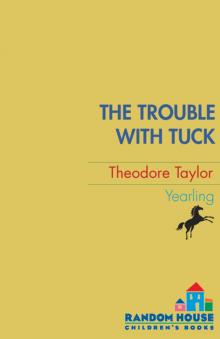 The Trouble With Tuck the Trouble With Tuck
The Trouble With Tuck the Trouble With Tuck The Bomb
The Bomb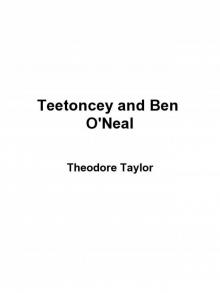 Teetoncey and Ben O'Neal
Teetoncey and Ben O'Neal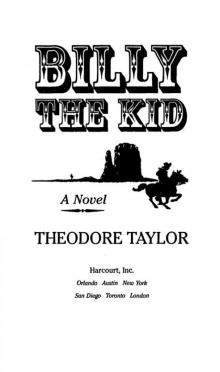 Billy the Kid
Billy the Kid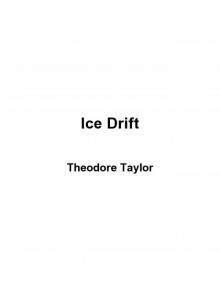 Ice Drift
Ice Drift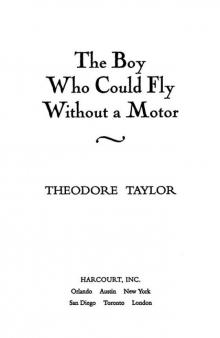 The Boy Who Could Fly Without a Motor
The Boy Who Could Fly Without a Motor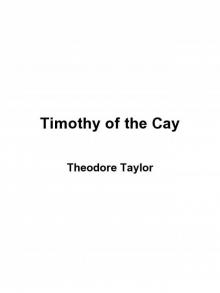 Timothy of the Cay
Timothy of the Cay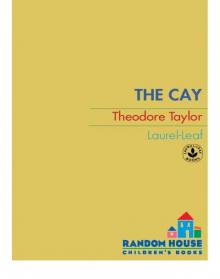 The Cay
The Cay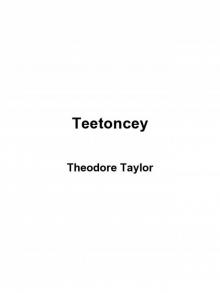 Teetoncey
Teetoncey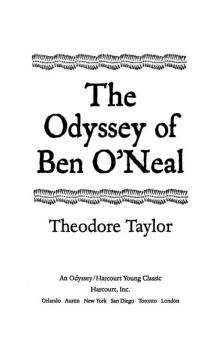 Into the Wind: The Odyssey of Ben O'Neal
Into the Wind: The Odyssey of Ben O'Neal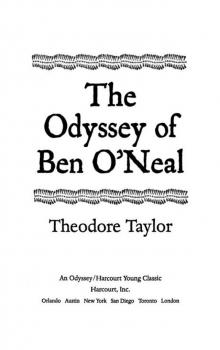 The Odyssey of Ben O'Neal
The Odyssey of Ben O'Neal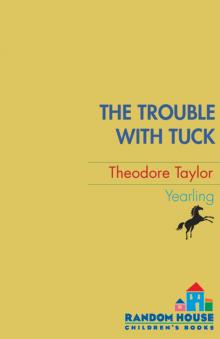 The Trouble with Tuck
The Trouble with Tuck